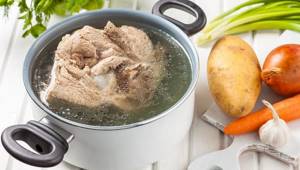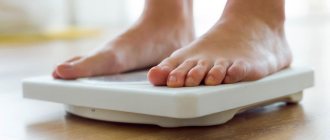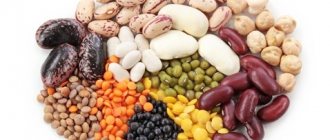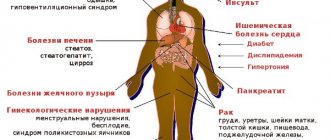The thyroid gland is an organ of the human endocrine system. Its main function is the production of hormones responsible for the regulation of metabolism: thyroxine (tetraiodothyronine, T4) and triiodothyronine (T3).
Often overweight people blame precisely its improper functioning for the fact that their figure leaves much to be desired, and it is useless for them to diet and exercise. In fact, this is only partly true. Indeed, the thyroid gland and excess weight can be interconnected. But, firstly, this is noted only in 25% of cases. Secondly, her diseases are treatable, which means weight loss is possible.
Weight problems, check your thyroid gland
The thyroid gland produces a special hormone - thyroxine. This hormone is responsible for how quickly metabolism occurs in the human body. If a person secretes the hormone in excess, then metabolic processes are accelerated, otherwise they are slowed down.
Metabolic slowdown is the main reason for weight gain.
And until the functioning of the gland is corrected, no physical exercise will give a lasting result.
Causes and symptoms of thyroid pathologies
Lack of thyroid hormone production is called hypothyroidism. The main reason for this deficiency is heredity. But there are other factors that provoke hormonal disorders, described below.
- Nervous overstrain. The influence of stressful situations reduces thyroid function. Nervous instability already indicates problems with the thyroid gland.
- Poor nutrition. An unbalanced diet leads to a deficiency of iodine and selenium in the body, or some elements contained in foods suppress the effect of iodine during digestion.
- Environmental pollution. The presence of radioactive elements in the atmosphere provokes pathologies of the thyroid gland.
- Increased pain. Frequent infectious or chronic diseases suppress the production of thyroid hormones.
- Medications. In addition to their benefits, frequently used medications cause harm to the body in general and the thyroid gland in particular.
Signs accompanying thyroid hypothyroidism:
- Fatigue. Chronic fatigue and loss of strength may indicate that the functioning of the thyroid gland is impaired, especially if this occurs after a healthy and proper rest.
- Depression and apathy, anxiety and discomfort, tension indicate problems with the thyroid gland.
- Weight begins to gain rapidly.
- Food preferences change, the effect of taste and olfactory receptors is weakened.
- Dry skin appears, hair becomes thin and dry, and falls out.
- There is a feeling of a lump in the throat, hoarseness in the voice. A tubercle can be felt at the bottom of the neck, indicating an enlarged thyroid gland.
- Instability in body temperature.
- Numbness of the arms and legs, tingling and pain in the muscles.
Signs of a lack of thyroxine production
- Decreased blood pressure, body temperature, pulse.
- Weakening of hearing, vision, memory, speed of information perception.
- Dry and flaky skin, early wrinkles, brittle hair and nails.
If you notice any of the following, you can do a small test:
You must help your body yourself
Before going to bed, apply three iodine strips of different intensities to the outer side of your right forearm: weak (1 smear), medium (2-3 smears) and dark (4-5 smears). In the morning, look how they have changed.
If only a light strip has been absorbed, then you can normalize the function of the thyroid gland, and, consequently, remove extra pounds, by yourself by choosing the right diet.
If all the strips are completely absorbed, you should see an endocrinologist. Only a specialist after examination will help you balance your thyroid function.
However, you should not expect quick results if you do not help your body yourself. Correctly selected physical exercises and diet will help not only to lose weight, but also to overcome the disease.
Sample menu for the week
To ensure that the diet for hyperthyroidism of the thyroid gland is varied, the maximum amount of healthy and permitted foods is included in the diet. Every day, people with hyperthyroidism are allowed to eat up to 0.3 kg of baked goods and no more than 30 g of granulated sugar. As part of the diet, dishes with meat or fish should be consumed twice a day.

During the treatment of hyperthyroidism, alcoholic beverages are completely excluded from the diet, as they have a stimulating effect on metabolism. Subject to the conditions of the diet, the performance of vital organs does not decrease.
Sample menu for a week for hyperthyroidism
| Days of the week | 1 breakfast | 2 breakfast | Dinner | Afternoon snack | Dinner |
| Monday | oatmeal, potato pancakes with carrots, tea with cream | 2 boiled eggs, sliced vegetables, juice | cream soup with cauliflower, meat quenelles, vinaigrette, fruit juice | 100 g raisins, drinking yoghurt | vegetable stew, boiled chicken, tea with honey |
| Tuesday | rice porridge, soft-boiled egg, oatmeal cookies, milk tea | cheesecakes with sour cream sauce, herbal infusion | noodle and meatball soup, stuffed peppers, vinaigrette, carrot juice | fruit pudding, kefir | noodle soup, casserole with pike and vegetables, fruit slices, jelly |
| Wednesday | semolina porridge, toast with cheese, soft-boiled egg, herbal tea | low-fat cottage cheese with sour cream and honey, compote | lean borscht, beef goulash, porridge with butter, fruit juice | cottage cheese casserole, kefir | chicken in sour cream sauce, sautéed vegetables, salad with tomatoes, jelly |
| Thursday | egg rolls with herbs, toast with jam, compote | carrot-curd casserole, weak coffee | okroshka, boiled beef, pancakes with potatoes and carrots, tea | cheesecake with cottage cheese | cabbage, pilaf with meat, weak tea |
| Friday | cheesecakes-pampushki, carrot juice | cottage cheese with honey or jam, herbal tea | chicken and mushroom soup, vinaigrette, toast with jam, coffee with cream | toast with jam, drinking yoghurt | kharcho with chicken and brown rice, baked pumpkin, vegetable juice |
| Saturday | semolina pudding, boiled egg, drinking yogurt | hot sandwich with cheese, jelly | cream soup with potatoes, baked pink salmon with carrots, rosehip infusion | curd-banana cocktail, apple | potato rolls with mushrooms, stuffed peppers, peach juice |
| Sunday | oatmeal pancakes, buckwheat porridge, kefir | lavash rolls with cottage cheese | noodle soup, lean lazy dumplings with meat, tea with cream | oatmeal cookies, tea | cheese soup with veal, carrot cutlets with semolina, juice |
The therapeutic diet should be followed until the level of iodine-containing hormones in the body stabilizes. To prevent hypovitaminosis and mineral deficiency due to hyperthyroidism, they prefer protein dishes and porridge for breakfast, and baked vegetables with fish for dinner.
Let's help ourselves or a thyroid diet for weight loss
Contraindications for diet
A diet for weight loss with thyroid disease excludes from your usual diet foods that overload the body with carbohydrates, fats, and salt:
- canned food, smoked meats, fatty meats, sausages;
- alcohol, coffee, strong tea;
- white bread, chocolate confectionery, sugar, white rice;
“Feed” your thyroid gland with iodine:
- conduct a week-long course of iodine massage;
- take baths with sea salt;
- Eat as many iodine-containing foods as possible.
Features of nutrition in case of imbalance
It is necessary to increase the amount of protein, fermented milk products, various cereals (except rice), vegetables and fruits.
Limit the consumption of foods that contain a lot of vitamin A: liver, pumpkin, carrots, apricot.
Make friends with legumes
Distribute your daily diet into 5 meals a day, adhering to the established diet. Make friends with legumes, corn, root vegetables. Millet and white cabbage are useless for people with thyroid diseases because they contain substances that prevent iodine from being absorbed. Drink more water (at least 1.5 liters per day).
Thyroid diet to get rid of extra pounds
Before switching to dietary nutrition, it is necessary to cleanse the body. First you should cleanse the intestines. There are many methods described, but the fastest and most effective is colon hydrotherapy.
The next stage is blood purification. Eating celery and garlic, radishes, flax seeds, and a decoction of the leaves and inflorescences of stinging nettle has a good effect.

Nutritionists recommend a vegetarian diet. The food should be quite varied.
This is not difficult to achieve, because the list of products is quite large:
- unrefined vegetable oil;
- low-fat fermented milk products;
- comb honey;
- porridge from buckwheat, oatmeal, barley, lentils;
- root vegetables, fresh or baked;
- dried fruits (figs, prunes, dates, apricots, dried apricots);
- zucchini, eggplant, corn, squash, peas, beans, soybeans;
- apples (with seeds), pears, apricots, plums;
- vegetable broths;
- dark bread, preferably without yeast;
- seafood;
- watermelons and melons;
- persimmon, grapes.
Also read
What can you eat when dieting for weight loss?
What you can and cannot eat with hyperthyroidism: food tables
For hyperthyroidism, the diet includes foods high in proteins, vitamins, minerals and trace elements. Due to the risk of osteoporosis, dairy products must be added to the menu. They contain calcium salts, which strengthen bones.
If there are problems with stool, fresh baked goods are removed from the diet - white bread, yeast dough. The basis of the diet for those suffering from hyperthyroidism is:
- dairy products;
- vegetables;
- dietary meat;
- fresh fruits;
- cereals
If hyperthyroidism is not accompanied by diarrhea, be sure to eat vegetable oils and vegetables with fiber. To avoid bloating and dyspepsia, legumes are removed from the diet.

For hyperthyroidism, it is recommended to boil raw meat. During heat treatment, more than 70% of extractive substances, which have a stimulating effect on the central nervous system, are removed from it.
Allowed and prohibited foods for hyperthyroidism
| Product groups | Allowed | Prohibited |
| fruits, berries, dried fruits | apples, grapes, bananas, kiwi, kiwi, plums, gooseberries, pears, grapefruit, strawberries, tangerines, melon, lime, watermelon, raspberries, pomegranate, raisins | cranberry, currant, persimmon |
| vegetables, greens | zucchini, pumpkin, carrots, sweet peppers, potatoes, cucumbers, white and cauliflower, eggplant | garlic, asparagus, rhubarb, canned cucumbers and tomatoes, horseradish, onions, beets, radishes |
| bakery products | rye bread, dry bread, bagels | yeast and puff pastry, fresh wheat bread |
| dairy | acidophilus, kefir, cream, yogurt, cottage cheese, hard cheese, yogurt | salted cottage cheese, feta cheese |
| cereals, porridge | rice, corn, buckwheat, oatmeal, millet, lentils, bulgur | barley and pearl barley porridge |
| seafood, fish | pike, red caviar, catfish, bream, river perch | shrimp, canned fish, squid, sardine, crayfish, lobster, crab sticks |
| meat products | turkey, veal, chicken, rabbit | pork, duck, goose, bacon, smoked meats |
| sweets | oatmeal cookies, fruit jam, marmalade, | dark chocolate, pastry cream |
| other products | honey, sugar, vegetable oil, sour cream sauce | black pepper, meat broth, mustard, mayonnaise, hot seasonings, curry sauce, ketchup |
| beverages | tea with milk, apricot juice, rosehip decoction, jelly, fruit juice, compote, carrot juice, mineral water | black tea, kumiss, alcohol, kvass, strong coffee |
Patients with hyperthyroidism often complain of indigestion and dyspepsia - nausea, heartburn, bloating, belching. To prevent fermentation in the gastrointestinal tract, sauerkraut, white bread and baked goods are excluded from the diet.

To reduce the severity of endocrine disorders in hyperthyroidism, goitrogenic products are introduced into the diet. They inhibit the synthesis of iodine-containing hormones and block the flow of iodine into the thyroid gland.
To stabilize hormonal levels, the diet includes:
- Brussels sprouts;
- rutabaga;
- tofu;
- peaches;
- peanut;
- millet;
- flax seeds;
- corn;
- spinach;
- pine nuts;
- strawberries
With regular consumption of goitrogenic foods, the concentration of T4 in the body decreases, which facilitates the course of hyperthyroidism.
A little about physical activity
Any diet for weight loss without reasonably selected, regular exercise is ineffective. According to physical therapy instructors, weight loss with a diseased thyroid gland can only be achieved through regular exercise for at least 1 hour a day.
One-hour cycling gives a good effect in combination with a balanced diet (no more than 2100 kcal per day).
Normalizing weight with a diseased thyroid gland is not an easy task.
The path to success will be difficult and long, but if you strictly follow the doctor’s recommendations, regular exercise, strict adherence to your daily routine and dietary restrictions, you will definitely achieve your goal.









